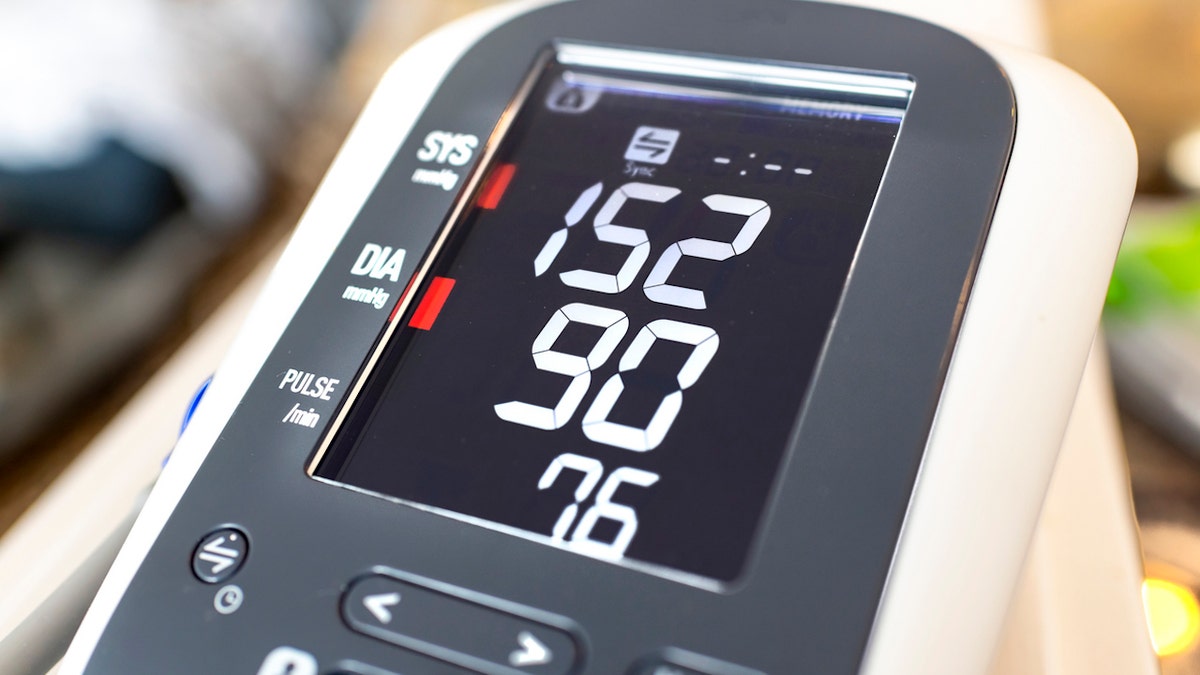Hypertension, or high blood pressure, is known to have a direct impact on heart attack and stroke risk — but a new study has revealed its surprising link to brain health.
In a large, randomized trial, researchers led by First Hospital of China Medical University discovered that “intensive blood pressure control” resulted in a 15% reduced dementia risk among participants and a 16% reduced risk of cognitive impairment.
The study included 33,995 people in rural China aged 40 or older who had “uncontrolled hypertension.”
7 BLOOD PRESSURE MISTAKES THAT COULD BE THROWING OFF YOUR READINGS
The participants were divided into two groups. One received “usual care,” while the other was assigned to “trained non-physician community healthcare providers” who prescribed “titrated antihypertensive medications.”

Hypertension, or high blood pressure, is known to have a direct impact on heart attack and stroke risk — but a new study has revealed its surprising link to brain health. (iStock)
For the latter group, the medications helped them achieve a systolic blood pressure goal of <130 mm Hg and a diastolic blood pressure goal of <80 mm Hg, according to the study findings in Nature Medicine.
“The primary outcome of all-cause dementia was significantly lower in the intervention group than in the usual care group,” the researchers wrote.
They were also less likely to experience “serious adverse events.”
HEALTH BOOST AND DEMENTIA PREVENTION IN JUST 5 MINUTES A DAY
This was one of the first large-scale, randomized, controlled effectiveness trials to demonstrate a “significant reduction in all-cause dementia associated with lowering blood pressure,” the researchers concluded.
There were some limitations of the study, the article acknowledged, including the absence of baseline and follow-up cognitive assessments.

“The primary outcome of all-cause dementia was significantly lower in the intervention group than in the usual care group,” the researchers wrote. (iStock)
Dr. Bradley Serwer — an interventional cardiologist and chief medical officer at VitalSolution, an Ingenovis Health company that offers cardiovascular and anesthesiology services to hospitals — said this study presents an “intriguing approach” to addressing dementia in individuals with uncontrolled hypertension.
JUST 5 MINUTES OF EXERCISE COULD REDUCE HIGH BLOOD PRESSURE, STUDY FINDS
“Unlike studies performed in the United States, this study employed non-physicians to significantly reduce blood pressure in rural China through a ‘cluster’ blinding method,” Ohio-based Serwer, who was not involved in the study, told Fox News Digital.

It would be beneficial to include baseline cognitive assessments of the patients and to identify the prevalence of Alzheimer’s dementia within the communities, one doctor noted. (iStock)
“While the study can be subject to scrutiny, it raises a pertinent question: How crucial is modification of cardiovascular risk factors in the development of dementia?”
The primary medications used in the study to lower blood pressure were calcium channel blockers and angiotensin receptor blockers, Serwer noted.
CLICK HERE TO GET THE FOX NEWS APP
“These commonly prescribed medications have been independently associated with a reduced risk of dementia, irrespective of the magnitude of blood pressure reduction they achieve,” he said.
“This raises the possibility that the lower rates of dementia observed may be attributed to other beneficial effects of the medications rather than solely to blood pressure reduction.”

This was one of the first large-scale, randomized, controlled effectiveness trials to demonstrate a “significant reduction in all-cause dementia associated with lowering blood pressure,” the researchers said. (iStock)
To confirm the findings, Serwer said it would be beneficial to include baseline cognitive assessments of the patients and to identify the prevalence of Alzheimer’s dementia within the communities.
“The most significant takeaway from this study is the profound importance of addressing blood pressure, cholesterol, smoking and sedentary lifestyles,” the cardiologist said.
CLICK HERE TO SIGN UP FOR OUR HEALTH NEWSLETTER
“By prioritizing these factors, we not only aim to prevent heart attacks and strokes, but also strive to enhance overall quality of life.”
The study was supported by the National Key Research and Development Program of the Ministry of Science and Technology of China, Chinese Society of Cardiology Foundation, and the Science and Technology Program of Liaoning Province, China.
For more Health articles, visit www.foxnews.com/health
Fox News Digital reached out to the researchers for comment.





